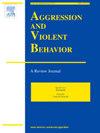功能失调时会增加攻击风险的神经认知系统以及转化为临床工具的潜力
IF 3.4
2区 心理学
Q1 CRIMINOLOGY & PENOLOGY
引用次数: 0
摘要
这篇叙述性综述论文的目的是探讨神经认知功能障碍会增加反应性和工具性攻击行为风险的形式。本文确定了似乎能介导、抑制或缓和反应性和工具性攻击行为的神经认知功能,并考虑了这些神经认知功能紊乱与攻击行为风险之间的关联数据。考虑的神经认知功能包括:急性威胁反应、情绪调节、基于强化的决策、反应控制、移情(对痛苦线索的反应)和从属关系。将考虑它们的功能作用、假定的神经基质以及表明攻击性人群功能障碍的数据。此外,还将简要考虑早期生活压力(虐待和忽视)可能对它们的发展产生的影响。最后,还将考虑神经认知指数的潜在效用以及如何评估这些神经认知系统的现状。本文章由计算机程序翻译,如有差异,请以英文原文为准。
Neuro-cognitive systems that, when dysfunctional, increase aggression risk and the potential for translation into clinical tools
The goal of this narrative review paper is to consider forms of neurocognitive dysfunction that increase risk for reactive and instrumental aggression. Neuro-cognitive functions that appear to mediate, inhibit or moderate reactive and instrumental aggression are identified and data on the association between perturbations of these neuro-cognitive functions and aggression risk are considered. The neuro-cognitive functions considered are: the acute threat response, emotion regulation, reinforcement-based decision-making, response control, empathy (responsiveness to distress cues) and affiliation. Their functional roles, putative neural substrates and data indicating dysfunction in aggressive populations will be considered. Moreover, brief considerations will be given regarding the impact of early life stress (abuse and neglect) may have on their development. Finally, the current situation with respect to the potential utility of neuro-cognitive indices and how such neuro-cognitive systems might be assessed is considered.
求助全文
通过发布文献求助,成功后即可免费获取论文全文。
去求助
来源期刊

Aggression and Violent Behavior
Multiple-
CiteScore
7.50
自引率
4.30%
发文量
63
期刊介绍:
Aggression and Violent Behavior, A Review Journal is a multidisciplinary journal that publishes substantive and integrative reviews, as well as summary reports of innovative ongoing clinical research programs on a wide range of topics germane to the field of aggression and violent behavior. Papers encompass a large variety of issues, populations, and domains, including homicide (serial, spree, and mass murder: sexual homicide), sexual deviance and assault (rape, serial rape, child molestation, paraphilias), child and youth violence (firesetting, gang violence, juvenile sexual offending), family violence (child physical and sexual abuse, child neglect, incest, spouse and elder abuse), genetic predispositions, and the physiological basis of aggression.
 求助内容:
求助内容: 应助结果提醒方式:
应助结果提醒方式:


